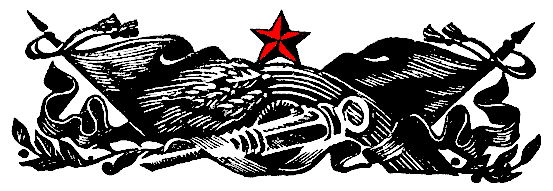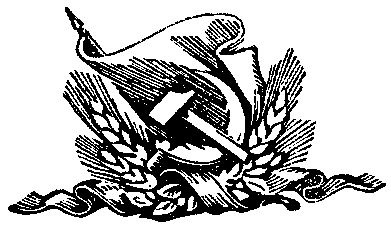
1936 CONSTITUTION OF THE USSR
Adopted December 1936
CHAPTER X

FUNDAMENTAL RIGHTS AND DUTIES OF CITIZENS

CHAPTER X

FUNDAMENTAL RIGHTS AND DUTIES OF CITIZENS
ARTICLE 118. Citizens of the U.S.S.R. have the right to work, that is, are guaranteed the right to employment and payment for their work in accordance With its quantity and quality.
ARTICLE 119. Citizens of the U.S.S.R. have the right to rest and leisure. The right to rest and leisure is ensured by the reduction of the working day to seven hours for the overwhelming majority of the workers, the institution of annual vacations with full pay for workers and employees and the provision of a wide network of sanatoria, rest homes and clubs for the accommodation of the working people.
ARTICLE 120. Citizens of the U.S.S.R. have the right to maintenance in old age and also in case of sickness or loss of capacity to work. This right is ensured by the extensive development of social insurance of workers and employees at state expense, free medical service for the working people and the provision of a wide network of health resorts for the use of the working people.
ARTICLE 121. Citizens of the U.S.S.R. have the right to education. This right is ensured by universal, compulsory elementary education; by education, including higher education, being free of charge; by the system of state stipends for the overwhelming majority of students in the universities and colleges; by instruction in schools being conducted in the native Ianguage, and by the organization in the factories, state farms, machine and tractor stations and collective farms of free vocational, technical and agronomic training for the working people.
ARTICLE 122. Women in the U.S.S.R. are accorded equal rights with men in all spheres of economic, state, cultural, social and political life. The possibility of exercising these rights is ensured to women by granting them an equal right with men to work, payment for work, rest and leisure, social insurance and education, and by state protection of the interests of mother and child, prematernity and maternity leave with full pay, and the provision of a wide network of maternity homes, nurseries and kindergartens.
ARTICLE 123. Equality of rights of citizens of the U.S.S.R., irrespective of their nationality or race, in all spheres of economic, state, cultural, social and political life, is an indefeasible law. Any direct or indirect restriction of the rights of, or, conversely, any establishment of direct or indirect privileges for, citizens on account of their race or nationality, as well as any advocacy of racial or national exclusiveness or hatred and contempt, is punishable by law.
ARTICLE 124. In order to ensure to citizens freedom of conscience, the church in the U.S.S.R. is separated from the state, and the school from the church. Freedom of religious worship and freedom of antireligious propaganda is recognized for all citizens.
ARTICLE 125. In conformity with the interests of the working people, and in order to strengthen the socialist system, the citizens of the U.S.S.R. are guaranteed by law:
ARTICLE 126. In conformity with the interests of the working people, and in order to develop the organizational initiative and political activity of the masses of the people, citizens of the U.S.S.R. are ensured the right to unite in public organizations--trade unions, cooperative associations, youth organizations,' sport and defense organizations, cultural, technical and scientific societies; and the most active and politically most conscious citizens in the ranks of the working class and other sections of the working people unite in the Communist Party of the Soviet Union (Bolsheviks), which is the vanguard of the working people in their struggle to strengthen and develop the socialist system and is the leading core of all organizations of the working people, both public and state.
ARTICLE 127. Citizens of the U.S.S.R. are guaranteed inviolability of the person. No person may be placed under arrest except by decision of a court or with the sanction of a procurator.
ARTICLE 128. The inviolability of the homes of citizens and privacy of correspondence are protected by law.
ARTICLE 129. The U.S.S.R. affords the right of asylum to foreign citizens persecuted for defending the interests of the working people, or for their scientific activities, or for their struggle for national liberation.
ARTICLE 130. It is the duty of every citizen of the U.S.S.R. to abide by the Constitution of the Union of Soviet Socialist Republics, to observe the laws, to maintain labor discipline, honestly to perform public duties, and to respect the rules of socialist intercourse.
ARTICLE 131. It is the duty of every citizen of the U.S.S.R. to safeguard and strengthen public, socialist property as the sacred and inviolable foundation of the Soviet system, as the source of the wealth and might of the country, as the source of the rosperous and cultured life of all the working people.
ARTICLE 132. Universal military service is law. Military service in the Workers' and Peasants' Red Army is an honorable duty of the citizens of the U.S.S.R.
ARTICLE 133. To defend the fatherland is the sacred duty of every citizen of the U.S.S.R. Treason to the country--violation of the oath of allegiance, desertion to the enemy, impairing the military power of the state, espionage is punishable with all the severity of the law as the most heinous of crimes.

ARTICLE 134. Members of all Soviets of Working People's Deputies--of the Supreme Soviet of the U.S.S.R., the Supreme Soviets of the Union Republics, the Soviets of Working People's Deputies of the Territories and Regions, the Supreme Soviets of the Autonomous Republics, and Soviets of Working People's Deputies of Autonomous Regions, area, district, city and rural (station, village, hamlet, kishlak, aul) Soviets of Working People's Deputies--are chosen by the electors on the basis of universal, direct and equal suffrage by secret ballot.
ARTICLE 135. Elections of deputies are universal: all citizens of the U.S.S.R. who have reached the age of eighteen, irrespective of race or nationality, religion, educational and residential qualifications, social origin, property status or past activities, have the right to vote in the election of deputies and to be elected, with the exception of insane persons and persons who have been convicted by a court of law and whose sentences include deprivation of electoral rights.
ARTICLE 136. Elections of deputies are equal: each citizen has one vote; all citizens participate in elections on an equal footing.
ARTICLE 137. Women have the right to elect and be elected on equal terms with men.
ARTICLE 138. Citizens serving in the Red Army have the right to elect and be elected on equal terms with all other citizens.
ARTICLE 139. Elections of deputies are direct: all Soviets of Working People's Deputies, from rural and city Soviets of Working People's Deputies to the Supreme Soviet of the U.S.S.R., inclusive, are elected by the citizens by direct vote.
ARTICLE 140. Voting at elections of deputies is secret.
ARTICLE 141. Candidates for election are nominated according to electoral areas. The right to nominate candidates is secured to public organizations and societies of the working people: Communist Party organizations, trade unions, cooperatives, youth organizations and cultural societies.
ARTICLE 142. It is the duty of every deputy to report to his electors on his work and on the work of the Soviet of Working People's Deputies, and he is liable to be recalled at any time in the manner established by law upon decision of a majority of the electors.

ARTICLE 143. The arms of the Union of Soviet Socialist Republics consist of a sickle and hammer against a globe depicted in the rays of the sun and surrounded by ears of grain with the inscription "Workers of All Countries, Unite!" in the languages of the Union Republics. At the top of the arms is a five-pointed star. Socialist Republics is of red cloth with the sickle and hammer depicted in gold in the upper corner near the staff and above them a five-pointed red star bordered in gold. The ratio of the width to the length is 1: 2.
ARTICLE 145. The capital of the Union of Soviet Socialist Republics is the City of Moscow.

ARTICLE 146. The Constitution of the U.S.S.R. may be amended only by decision of the Supreme Soviet of the U.S.S.R. adopted by a majority of not less than two-thirds of the votes cast in each of its Chambers.
Bucknell University, Lewisburg, PA 17837
© 1996 Robert Beard